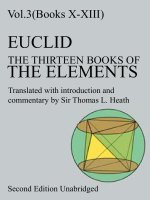The greek anthology vol 2, books VII VIII
Bạn đang xem bản rút gọn của tài liệu. Xem và tải ngay bản đầy đủ của tài liệu tại đây (18.58 MB, 536 trang )
Iprescntct) to
of tbc
iJlntverait^ of
Toronto
bB
Bertram
1R. 2)avi6
from tbc books of
tbe late Xionel 2)avi6, Ik.C.
THE LOEB CLASSICAL LIBRARY
EDITED BY
E.
CAPPS, Ph.D., LL.D.
T. E.
PAGE,
Litt.D.
W, H. D. ROUSa, Lirr.D,
THE GREEK ANTHOLOGY
II
THE GREEK ANTHOLOGY.
Volume
I.
CHRISTIAN EPIGRAMS.
CHRISTODORUS OF THEBES IN EGYPT.
THE CYZICENB EPIGRAMS.
THE PROEMS OF THE DIFFERENT ANTHOLOGIES.
THE AMATORY EPIGRAMS.
THE DJiDICATORY EPIGRAMS.
Volume
III.
THE DECLAMATORY EPIGRAMS.
Volume
THE
HORTATORY
IV.
AND
ADMONITORY
EPIGRAMS.
THE CONVIVIAL AND SATIRICAL
GRAMS.
STRATO'S MU:Volume
EPI-
V.
EPIGRAMS IN VARIOUS METRES.
ARITHMETICAL PROBLEMS, RIDDLES
'
ORACLES.
MISCELLANEA.
EPIGRAMS OF THE PLANUDEAN ANTHOLOGY NOT IN THE PALATINE MANUSCRIPT.
THE GREEK
ANTHOLOGY
WITH AN ENGLISH TRANSLATION BY
W.
R.
IN FIVE
PATON
VOLUMES
II
LONDON
:
NEW YORK
WILLIAM HEINEMANN
:
G.
P.
MOMXIX
PUTNAM'S SONS
First printed 1917.
Reprinted 1919.
CONTENTS
BOOK
— SEPULCHRAL EPIGRAMS
VIII. — THE EPIGRAMS OF SAINT
PAGE
1
VII.
BOOK
THEOLOGIAN
GENERAL INDEX
GREGORY THE
399
.
.
.
509
,
INDEX OF AUTHORS INCLUDED IN THIS VOLUME
.
.
.
515
GREEK ANTHOLOGY
BOOK
VII
SEPULCHRAL EPIGRAMS
The
genuine epitaphs
(tliose actually
engraved on tomb-
stones) in this collection are comparatively few in number.
It would be easy to draw up a list of them, but I refrain
from this, as there are too many doubtful cases. Those on
celebrities are of course all poetical exercises in the form of
of those on unknown
epitaphs, but a considerable number
In order to appreciate the
persons are doubtless the same.
(ireek sepulchral epigram as it was, we should have a selection
of those actually preserved on stones. Cephalas has introduced
a few copied from stones (330-335, 340, 346), but Meleager,
Philippus, and Agathias drew, of course, from literary and
not epigraphical sources in forming their anthologies.
Nothing can be less certain than the attributions to the
elder poets (Anacreon, Simonides, etc.) in this book: we
may be sure that, while they published their lyrics, they did
not publish collections of occasional epigrams so that the
latter are attributed to them merely by hearsay and guesswork. The authorsliip of the few epigrams (some very
beautiful) attributed to Plato is now a matter of dispute, but
I think we have no right to deny it, as they are very short
and would have survived in memory. The attributions to
the epigrams
later writers are doubtless in the main correct
;
—
Theocritus being included in MSS. of his works, and
derived from such a MS. and not from Meleager, who does
not, curiously enough, mention him in his Proem.
Here, as in Book VI, continuous portions of the three
Nos. 1-150, epigrams on
chief sources are the exception.
famous men (chiefly poets and philosophers), could not of
course comprise any such.
Overlooking shorter fragments,
Nos. 194-203,1 207-212, 246-273, 296-303, 314-318, 406-529,
535-541, 646-655, 707-740 are from Meleager's Wreath,
183-188, 233-240, 364-405, 622-645, 699-703 are from that
of Philippus, and 551-614 from the Cycle of Agathias.
Nos. 681-6S8 are by Palladas.
of
1 All ou
animals, but in the alphabetical order of the
the fragments of Philippus' Wreath.
VOL.
11.
first letters, like
B
ANGOAOriA
z
EnirPAMMATA EHITTMBIA
1.— AAKAIOT
ME^SHNIOT
'Hpcocov Tov aoLhov"\(p evL TralSe^'O/u.tjpov
t]Ka')(ov, e/c
ve/crapi
S'
^lovaewv
elvoKiai
yp2(f)ov v(})7]vdfi6i>oi'
'^rjpiylhe'i
i'^piaavTO,
Kol veKVV uKTairj dtjKav vtto aTTiXaSi,
oTTi (Bertv KvSrjve koI v'lea, koI [xoOov aWcov
ypcowv, ^lOaKov t epy/Mara AapTiuSeco.
oX^LCTTT) vrjacov 'irovTcp "J09, otti KCKevOe
^iov(xd(ov
^at.7]
darepa Kol
xs^aplrcov.
2.—ANTinATPOT SIAHNIOT
Tav
fxepoTTcov TleLOoOy
to
pue'^/a
aropa, rav Xaa Moycra/9
(pOey^afievav Ke(f)a\dv, w ^eve, ^laiovLSeco
aS' eXa')(ov vacriTiiepov,
'
2
The
aK}C ev
riddle
epuoL,
irvevpia Oavcov eXcirev,
which HQmer, according to the
storj^,
couhl
GREEK ANTHOLOGY
BOOK
VII
SEPULCHRAL EPIGRAMS
L—ALCAEUS
0)1
OF MESSENE
Homer
^
In Ios the boys, weaving a riddle at the bidding of
the Muses, vexed to death Homer the singer of the
And the Nereids of the sea anointed him
heroes.
with nectar and laid him dead under the rock on
the shore because he glorified Thetis and her son
«nd the battle-din of the other heroes and the deeds
Blessed among the islands
of Odysseus of Ithaca.
in the sea is los, for small though she be, she covers
the star of the Muses and Graces.
;
2.~ANTIPATER OF
On
the
SI
DON
Same
O
STRANGER, it is granted to me, this island rock
of los, to hold Maeonides, the Persuader of men, the
For in
Muses.
mighty-voiced, who sang even as the
no other island but in me did he leave, when he died,
the holy breath with which he told of the almighty
not guess was " What we caught we left, what we did not
catch we bring," i.e. lice.
:
3
h
-2
GREEK ANTHOLOGY
KpoviSao to 7ra'yH:paTe
xal TOP 'A^^tXXetotis ^apaa'\[aiv"FjKTopa irdiiKoL'i
(b
vevfia
oarea AapSaviKO) ^pviTTOfjievov TreSUp.
oXlya KpvTVTU) rov toKlkov, XaQ^ on KevOet
KoX (deTi8o<; jafierav d (3pa')(y^(aKo
5
el S'
2
El KoX
B.
—AAAO
^ai,o
aXka
10
firj pie
irapeXOrj^;,
laa Oeolai oejSov
TOP yap ULeplSeacTt reripbevov e^ox^ Moycrat?
KaracTTtelaaf;,
iroLrjTi-jv iirecov
6€?ov"0p,i]pov e^&>.
:l— AAHAON
'Ef^aSc
avhpoiv
rr]v leprjv
Ke^akrjv Kara yaia KoKinnei,
rjpoocop Koapbrjropa,
delov' OpLiiipov.
4.— nATAOT XIAENTIAPIOT
'Ei^^aSe Yliepihcov to
cro(f)OV (TTOfxa,
Oelov "Ofirjpov,
K\€ivoel S" oXiyt]
piT]
ToSe
yeyavla roaov
0af.i/3y
co
^(^dZev
dvepa
in](T0^,
^eve, hepKopievo^'
Kol yap dXrjTevovcTa KacnyviyrT] Trore Ai/Xo?
diT
pbrjTpo
doBivcov
Se^aro Ar)rotB)]v.
6
BOOK
VII. 2-4
nod of Zeus, and of Olympus, and of the strength
of Ajax fighting for the ships, and of Hector his
fiesh stripped from his bones by the Thessahan horses
of Achilles that dragged him over the plain of Troy.
If thou marvellest that I who am so small cover so
likegreat a man, know that the spouse of Thetis
wise lies in Ikos that hath but a few clods of
earth.
2
B.
— Anonymous
On
the
Same
\Vayfarer, though the tomb be small, pass me not
me a libation, and venerate me as
For I hold divine Homer the
thou dost the gods.
honoured
of
the
exceedingly by the Pierian
epic,
poet
Muses.
by, but pour on
3.
— Anonymous
0)1
Here the
the
Same
earth covereth the sacred man, divine
heroes.
Homer, the marshaller of the
4.— PAULUS SILENTIARIUS
On
the
Same
Here the famous tomb on the rock by thfc sea
holdeth divine Homer, the skilled mouth by which
Wonder not, O stranger, as thou
the Muses spoke.
lookest, if so little an island can contain so great a
man. For my sister Delos, while she wandered yet
on the waves, received Apollo from his mother's
womb.
GREEK ANTHOLOGY
5.— A AH AON,
OvB'
ovK
8€
c^arrlv
AAKAIOT
ei /le ^(^pvaeiov utto paiar'P]po<; "0/j,')]pov
Otis'
eifji
ecropat 'Sa\ap,ivio<;, ouS' 6 MeXr^ro?
Ap-T]a-ajopov
dWov
Kol
ol
p,r}
ravr opp^aatv 'EXAa?
TTOitjrrjv /3aaavl(^€T€-
Tupa
^LO'i, 'FjWtjvcov iratalv
Se,
detaeT
cSot.
Mouaat
eTrrj.
6.— ANTinATPOT SIAONIOT
KapvK apera^,
'Hpoicov
p^aKtipcov Se 7rpo(f})]Tav,
'
EjWcivcop
Moucrcof
/BiOTO,
Bevrepov deXiov,
(f)ejyo<;" O p,7]poi'
Traj'TO?,
dyijpavrov aropa Kuapov
dXippodla, ^elve, K€Kev6e k6vi<;.
,
7.— AAAO
'EvOdSe d€tO'i"Opr]po^, 09 'KXXdBa Trdaav aeiae,
8.— ANTIHATPOT ^lAHNIOT
OvK6Ti
OeXyopLei'a'i, 'Opcpeu, Spva<;,
ovKert Trerpa?
a^ei
ov vi(beTcov avpp.ov'i, ov Trarayevcrav oka.
^
2
6
To
call himself yours.
This epigram is not meant to be sepulchral, but refers to
BOOK
5.
— Uncertain,
VII. 5-8
by Some Attributed to
ALCAEUS
On
the Same.
Noj not even if ye set me. Homer, up all of beaten
of Zeus, I am not and
gold in the burning lightning
will not be a Salaminian, I the son of Meles will not
be the son of Dmesagoras let not Greece look on
that.
Tempt some other poet,i but it is thou, Chios,
who with the Muses shalt sing my verses to the sons
;
of Hellas.2
6.— ANTIPATER OF SIDON
On
the
Same
O
STRANGER, the sea-bcat earth covers Homer, the
herald of the heroes' valour, the spokesman of the
the life of the Greeks, the light
gods, a second sun to
of the Muses, the mouth that groweth not old of the
whole world.
7.
— Anonymous
On
the
Same
divine Homer, who sang of
born in Thebes of the hundred gates. ^
Here
is
all
Hellas,
8.— ANTIPATER OF SIDON
of Oeagrus and Calliope
No more, Orpheus, shalt thou lead t\\e charmed
oaks and rocks and the shepherdless herds of wild
No more shalt thou lull to sleep the howlbeasts.
and the hail, and the drifting snow, and
winds
ing
On
the poet Orpheus, son
a statue of Homer at Salamis in Cyprus, one of the towns
which claimed liis parentage.
3
i.t. ICgyptian U'hebes, which also claimed to be his birthplace.
7
GREEK ANTHOLOGY
wXeo
'ycip'
ere
Be
TroWa KaroiSvpavro
MvafMocrvva^, fidrrfp
Tfc
S'
arova-x^ev/xev e(f)' vldcnv, dv'iK
TraiScov 'AtSr^v ovSe deoi<; Bvva/j,t<; ;
(f)Oi/j.evoi
TMv
Ovyarpefi
5
e^o-^a J^aWioira.
akaXKelv
9.— AAMAFHTOT
'Op(f>ea ^pifCKLrjcn irapa TTpofxokfjaiv 'O\i5/i7rou
TV/ji/3o^ eX'^i'y
(p
Mouo-779 vlea KaXXioiryj^;,
dp! eaireTO irerprj
aw
Spve0^ vXovopcov
d^lrv)(^o
dyeXa,
09 TTore Koi reXerd-i p,varr]pi8a
6
Kal aTL^ov rjp(p(p ^euKTov erev^e irohl,
09 KoX dpLeiXiKTOio j3apu K.\vp,evuio vojjpa
KoX TOP aKi'fXrjTOV dvpuov eOeX^e \vpa.
«
10.— AAHAON
KaXXto7r779 ^Opfprja Kal Oldypoio davovra
eKkavaav ^avdal
arL/CTOv<; S'
p,vpia ^i(novihe<;'
rjpd^avro ^pa'^LOva'i, up(pLp,e\aivr}
Sevopevai aTToSifj @p7]LKL0v irXoKapov
Kal 5' avral (XTova'^evvTi avv evcjioppLyyi \vKeiw
epprj^av Movaat, hdKpua Uc€pL8e<;,
pivpopievat TOP dotSov eircoBvpavro he irerpai
Kac opve<;, a9 eparf] to rrpiv eueXye Xvprj.
11.— ASKAHniAAOT
'O
y\,VKvet)9
8
ovxl 7ro\v<;
dv TrapdeviKa^i ivveaKaiSeKeTev^i,
pcev,
5
i
BOOK
VII. 8-II
and the
For dead thou art
roaring sea.
thee much, and
daughters of Mnemosyne bewailed
before all thy mother Calliope.
Wliy sigh we for
our dead sons, when not even the gods have power
to protect their children from death ?
the
;
9.— DAMAGETUS
On the Smne
skirts
Thracian
on
the
tomb
The
Orpheus, son of the Muse Calliope
of
Olympus holds
whom
the trees
disobeyed not and the lifeless rocks followed, and
the herds of the forest beasts who discovered the
and first linked verse in
mystic rites of Bacchus,
heroic feet; who charmed with his lyre even the
of Hell, and his
heavy sense of the implacable Lord
;
;
unyielding wrath.
10.
— Anonymous
On
the
Same
The fair-haired daughters of Bistonia shed a thousand tears for Ori)heus dead, the son of Calliope and
Oeagrus they stained their tattooed arms with blood,
and dyed their Thracian locks with black ashes.
The very Muses of Pieria, with Apollo, the master
of the lute, burst into tears mourning for the singer,
and the rocks moaned, and the trees, that erst he
charmed with his lovely lyre.
;
11.— ASCLEPIADES
{inscribed on a Volume of her Poems)
sweet work of Erinna, not great indeed
the
This
in volume, as being that of a maiden of nineteen,
On Erinna
is
9
GREEK ANTHOLOGY
aW'
ttoWmv
erepcov
/XT)
Ta^v^
H. Merivale,
J.
1833, p. 205
Greek Poets,
J.
;
ii.
A.
Bvvaroirepo'i' el
toXIkov
ri
rjXOe,
S"
'Ai'Sa? fiOL
'iaj^ ovojia;
Collections from the Oreek Anthology,
Symonds the younger, in Studies of the
in
p. 305.
12.—A AH AON
"AoTi Xox^^ofxevrjp ere fieXiaaoTOKcov eap v/xvcov,
apTL Be KVKveiw ^deyyofM6vr]v (TT6p,aTi,
ha irXaTv Kvp.a Kapovrmv
rfKaaev ek ^A^^povra
Molpa, \ivok\o)(Ttou
ao^
S'
SeairoTi'i -ifKaicdri]^-
eirewv, "Upivva, Ka\.o<; 7r6voexetv 8e xopov^ dfjifMcya Uieptcnv.
5,
(jiOlcrOai,
13.— AEQNIAOT,
ol
B'e
MEAEAFPOT
HapdeviKav vedothov ev vjjivoiToXoiaL fieXtacrav
"Hptwav, Mova-MV avOea Bpeirrofxevav,
"A8a^ ek vpuevaiov dvapiraaev. y pa toS' ep.(ppo)v
" Bdaxavo'i eaa
Atha.
etTr' fc'TU/x&)9 a irak'
'
'
,
14.— ANTinATPOT SIAONIOT
TOi Kev9ei<;, %^a)i^ AloXi, Tav fierd Movaai<;
dvardv ^lovaav detSofxevav,
av KvTTpieirXcK dei^oDOV UtepiScov are^avov^
5
'EXXdBt p.ev Tepyjnv, aol Be ArXeo?. & TpteXiKTOV
XaTTcjico
d6avdrai,<;
Molpat BtvevaaL
vrjpLa
Kar
't)\aKdra
TTW? ovK UXdiaacrOe 7ravd(f)6iTOV rjp.ap doiBa>
BMP' 'EXiKoovidBcov ;
d(f)9iTa /jii]aa/J,eva
A. Lang, Grass of Parnassus, ed
lO
2,
p
173.
BOOK
VII. 11-14
but greater in power than that of
Death had not come early to me,
had &uch a name ?
12.
many others. If
who would have
— Anonymous
Oil the
Same
Just as thou wast giving birth to the spring of th}hoiie^'ed hymns, and beginning to sing with thv
swan-like voice. Fate, mistress of the distaff that
spins the thread, bore thee over the wide lake of
the dead to Acheron.
But the beautiful work,
Erinna, of thy verse cries aloud that thou art not
dead, but joinest in the dance of the Muses.
13.— LEONIDAS or MELEAGER
On the Same
As Erinna, the maiden honey-bee, the new
singer
was gathering the flowers of the
Muses, Hades carried her off to wed her. That was
a true word, indeed, the girl spoke when she lived
"
Hades, thou art an envious god."
in the poets' quire,
:
14.— ANTIPATER OF
On Sappho
SIDON
O Aeolian land, thou coverest Sappho, who with
the immortal Muses is celebrated as the mortal Muse;
whom Cypris and Eros together reared, with whom
Peitho wove the undying wreath of song, a joy to
Hellas and a glory to thee.
O ye Fates twirling the
triple thread on the spindle, why spun ye not an
everlasting life for the singer who devised the
deathless gifts of the Muses of Helicon ?
II
GREEK ANTHOLOGY
15.—ANTinATPOT
Ovvofid
Toaaov 8' vTTepecr')(ov aoihav
oaaov o ^latovL8a<;.
fxev XaiKJiio.
OrfKeiav, avSpcov
16.— niNTTOT
'Ocrrea /xev Kal Kwcfyov e^et Tucfio^ ovvojxa
at he aocjjal K€Lvr}
17.— TTAAIOT
'Sta7r(f)0v
AATPEA
XloXiKov TTupd rvplSov l(i)P, ^€V€, jxi] p.e Oavovaav
rav ^IvTiX'>]vaiav eWevr' docSoTToXoi'TovSe yap dvOpcoTrcov cKafiov %ep69* epya Be (pcoToov
e? Ta')(^Lvr]v eppct TOidSe \7]0e8ova.
he pie Moucrawy erdaj}'^ )(^dpii', oiv a^' eKdan]^
haifiovo'i dvdo'i ep.fj OrjKa trap evvedhi,
yvdiaeat eo? 'Ai'Seo) (jkotov eK<f>v'yov ovhe ri? earai
rjv
tt}? \vpLKrj<;
SaTT^oO?
voovvp.O'; rjeXio<}.
18.— ANTinATPOT ©ESSAAONIKE.QIS
'Avepa
ui] Trerpr] reKpaiipeo.
6(f)6T]vai,
fxejdXov
5'
\no^
6 Tvp.l3o
oarea ^&)to9
elh7](Tei<; 'A/V/cyuai^a, \vprj<;
t'%e<-
eXarrjpa AaKaim]<;
e^oxov, op Movaecop ewe dpL6p,oKelrai S' yireipoi^; hiSv/.wi'i epi^,
oye AuSo?,
eW
etre AdKcop- TroXXal pLrjTepe<; vp,vo7r6Xcop.
I
2
BOOK
VII.
15-18
15— ANTIPATER
On the Same
is
name
My
Sappho^ and I excelled all women
song as much as Maeonides excelled men.
in
16.— PINYTUS
On the Same
The tomb holds the bones and the dumb name of
Sapphoj but her skilled words are immortal.
17.— TULLIUS LAUREAS
On the Same
When thou passest, O stranger, by the Aeolian
tomb, say not that I, the Lesbian poetess, am dead.
This tomb was built by the hands of men, and such
works of mortals are lost in swift oblivion. But if
thou enquirest about me for the sake of the Muses,
from each of whom I took a flower to lay beside my
nine flowers of song,i thou shalt find that I escaped
the darkness of death, and that no sun shall dawn
and set without memory of lyric Sappho.
18.— ANTIPATER OF
THESSALONICA
On Alanan
Do not judge the man by the stone. Simple is
the tomb to look on, but holds the bones of a great
man. Thou shalt know Alcman the supreme striker
of the Laconian lyre, possessed by the nine Muses.
Here resteth he, a cause of dispute to two continents,
if He be a Lydian or a Spartan. Minstrels have many
mothers.
1
i.e.
books of
verse.
13









